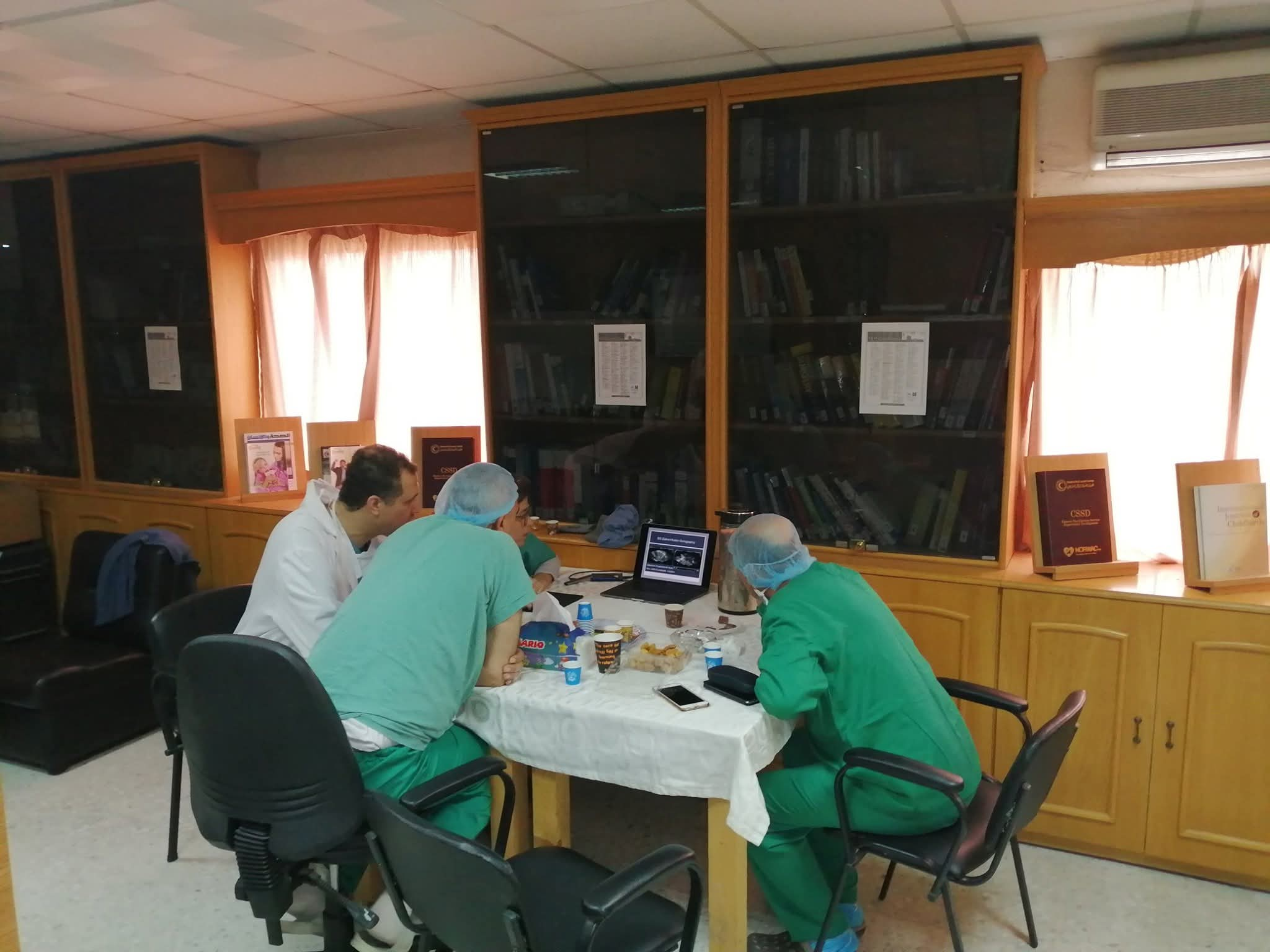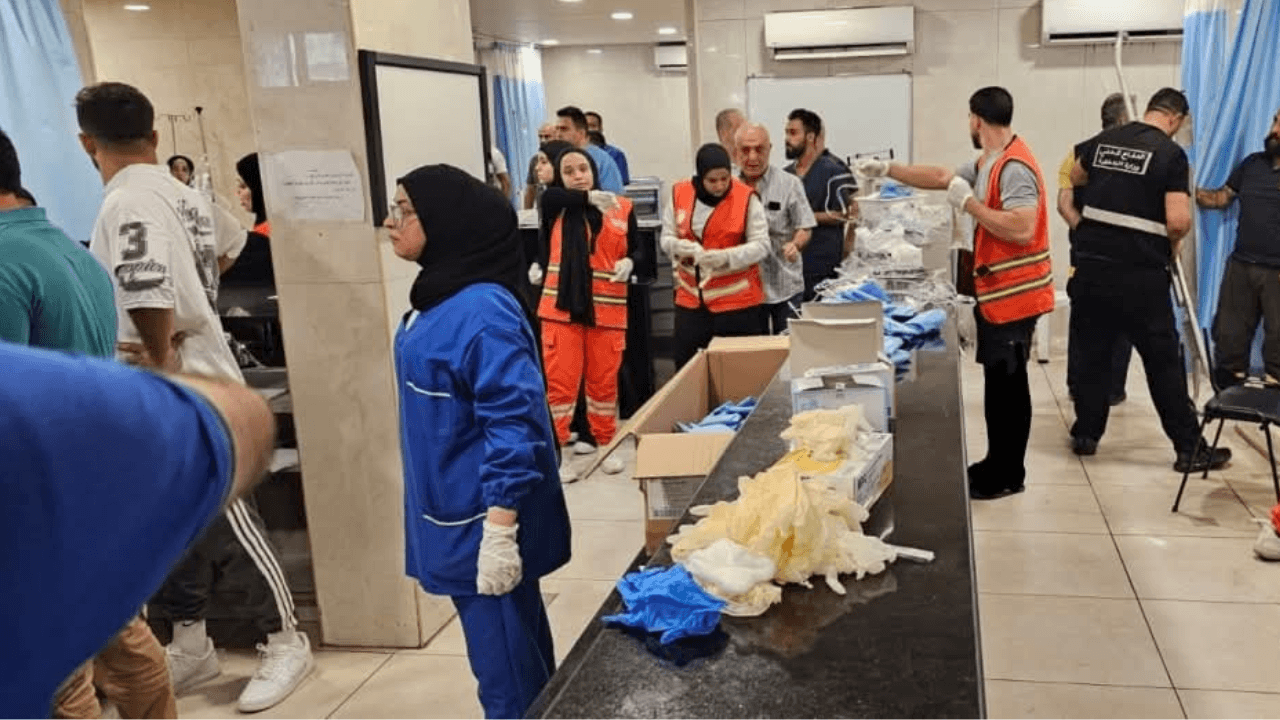UK-Qatar health tech startup Rhazes AI has launched a first-of-its-kind pilot at Al Hamshari Hospital in southern Lebanon, bringing advanced clinical AI tools into one of the most under-resourced medical environments in the region.
The initiative is part of a controlled trial to evaluate how AI can ease the administrative burden on frontline doctors working under extreme pressure.
The pilot is funded by Rhazes AI, conducted in partnership with the Palestine Red Crescent Society, which runs the hospital, as part of a joint effort to strengthen frontline care in one of the region’s most underserved hospital systems.
Rhazes AI develops generative AI technology for the healthcare sector, focusing on clinician productivity and administrative tasks.
The company provides an assistant that transcribes consultations, generates medical documents, suggests diagnoses, and automates billing processes, ensuring compliance with data protection regulations.
I spoke to Dr Zaid Al-fagih, co-founder and CEO of Rhazes AI to learn more about it.
A lifeline for Lebanon’s largest Palestinian refugee camp.
AI Hamshari, operated by the Palestine Red Crescent Society, is located near Ein el Hilweh, Lebanon’s largest Palestinian refugee camp. Palestinian refugees in Lebanon are excluded from the national healthcare system, leaving hospitals like Al Hamshari to carry the full burden of care with limited international support.
The hospital has 80 beds, 56 doctors, and 31 nurses, yet serves over 4,000 patients each month and frequently performs more than 400 surgeries during times of crisis. It remains the only facility with a working dialysis unit serving the southern camps.
AI that adapts to low-resource environments
Under the new partnership, Rhazes is deploying an AI clinical assistant across the hospital’s outpatient and emergency departments. The agentic platform adapts to low-resource environments without requiring extensive hospital infrastructure
According to Dr Al-fagih, in a lot of the hospitals the startup works with, especially the super low-resource providers, they don’t really have electronic health records.
“Sometimes there’s literally one computer for many doctors. They also don’t have access to cutting-edge medical knowledge, since a lot of guideline services are subscription-only.
Generally speaking, these hospitals are very low-resource. But that also means the potential impact can actually be much greater than in high-resource environments, where the big marginal gains have already been achieved.”
The Rhazes AI platform is highly adaptable and can be tailored to a doctor’s specific workflow and environment. It supports multiple languages for both input and output, and provides doctors with access to the latest up-to-date medical guidelines.
“So, in a way,” shared Dr Al-fagih, “we’re enabling hospitals that previously had very limited digital capabilities to access tools they would never have had before — things like digital note-taking, clinical guidance, and management plans.
An AI assistant that thinks like a clinician
Specifically, Rhazes AI supports doctors end-to-end by transcribing consultations in real time. But it also goes further — it generates a tailored management plan for the specific patient.
“For example, if someone needs antibiotics but is allergic to penicillin, it knows to recommend clarithromycin instead. It tailors recommendations based on medical guidelines and the individual patient’s characteristics,” shared Dr Al-fagih.
The tool also automates documentation processes, helping doctors to create structured summaries, admission notes, billing codes, and insights from the patient record. This reduces administrative burden and enables more efficient care.
According to Dr Al-fagih, “We can also integrate third-party tools and customise everything. It even supports ICD and CPT coding — the systems used for recordkeeping and billing. So, it’s much more than a transcription tool. It’s an adaptable clinical assistant.”
Empowering overstretched Doctors

The Al Hamshari Hospital is staffed primarily by Palestinian doctors who, due to the absence of referral pathways or tertiary hospitals, must act as generalists, specialists, and emergency physicians all at once.
Many see upwards of 60 patients per day. The burden of clinical documentation is immense and often falls on the shoulders of already overstretched teams.
Dr Al-fagih shared that while doctors in high resource setting like the UK are highly specialised, typically focusing on a narrow speciality once they reach consultant level, in many less developed countries — and particularly in under-resourced public hospitals — doctors have to be generalists.
“They cover a broad range of cases, far beyond their core speciality. That’s a huge source of potential medical error. So one of the biggest areas of impact for Rhazes AI is in clinical management support.
A doctor can speak with a patient, and our platform writes down everything that’s said. They can add existing patient information, and the system will suggest what that patient needs — the right diagnostic tests, treatment plans, and referrals.”
He contends that having that level of decision support is basically unprecedented in these places. It’s not that doctors are less competent — they’re just spread very thin across disciplines.
“As an internal medicine physician, for instance, I would never have to deal with a surgical problem in the UK.
But in many of these hospitals, you do. So, we’re giving them the tools to safely expand their scope.”
Leap from medicine to macro-level change
Around four years ago, Dr Al-fagih did a Master’s in Public Policy, and experiencing the world outside medicine for the second time made him think, “I want to solve the challenges that doctors face at a macro level.”
He asserts that understanding these problems from a policymaker’s perspective, rather than as an operator, was a really enlightening experience.
“Coming out of that, I had a choice: go back into medicine and practice as a doctor at the front lines again, or try to reimagine how doctors work — to make it more efficient, more effective, and more human.
At the time, I had just completed my research on an unrelated AI project, which coincided with the AI boom around 2023. That’s when the idea for Rhazes AI came into fruition."
The startup raised its first check in November 2023.
Fighting diagnostic error at scale
Further, Dr Al-fagih sees AI tools are a critical means to help doctors to tackle diagnostic error, which occurs in 1 in 14 general medical hospital patients. In the United States, around 800,000 people each year die or are permanently disabled due to misdiagnosis across care settings.
Decades of post-mortem research also indicate that diagnostic errors contribute to approximately 10 per cent of patient deaths. These are solvable failures of systems and support, not of clinician intent.
He asserts that doctors urgently need tools to automate documentation, easing the workload on stressed clinicians, whilst also providing a second, unbiased ‘set of eyes’ to help doctors avoid missed illnesses in one or two visits, let alone three.
A smartphone-powered leap forward
Back in Lebanon, for many doctors, who’ve never used an electronic health record, Rhazes AI provides a massive jump in capability. “Some are genuinely blown away,” shared Dr Al-Fagih.
Crucially, the platform is mobile-friendly — health professionals can use it on smartphones, even print directly from their phone. So, in hospitals with only a couple of computers, it still fits seamlessly into their workflow. For Dr-Al Fagih, it's been interesting seeing the contrast between different sites.
“For example, in some hospitals, there are literally two computers for the entire staff. That’s been a major challenge.
We’re also running this as a study, so ideally, we’d have lots of granular data. But that kind of infrastructure just isn’t there — not from negligence, but simply because priorities are elsewhere, and budgets are tight.
That said, doctors can still use our platform entirely from their smartphones. The hospitals are in cities, so there’s at least some cellular coverage. They can write up notes and even print directly from their phones.”
Innovation shouldn’t wait for perfect conditions
Rhazes AI’s approach challenges the idea of when to innovate:
“Advanced tools don’t need to wait for perfect conditions; they should start where the need is greatest,” asserts Dr Al-Fagih.
"In an age where AI too often deepens inequality, this is an example of what it looks like to close that gap. It’s time for innovation to meet people where they are.”
"Doctors here carry entire communities”
Rola Soboh, a Rhazes AI associate implementing the pilot, said:
“I have supported multiple research and humanitarian projects focused on refugee health and wellbeing in Lebanon, and this project is deeply personal. This hospital isn’t just a building, it’s a lifeline.
“Doctors here don’t just treat patients, they carry entire communities.
So, when we talk about easing their load, it’s not just administrative, it’s emotional, physical, everything. To see cutting-edge technology actually serve people like this, in a place that’s so often forgotten, gives me a sense of real hope.”
Rhazes Ai is also working with several hospital systems in the Gulf region to deploy at scale.
“They’re quite advanced digitally, so it’s an exciting partnership,” shared Dr Al-Fagih.
One area Rhazes is now exploring is creating a lightweight, cloud-based electronic health record (EHR) that’s AI-native — accessible via smartphone and usable by all doctors within a hospital.
“That could be a game-changer for places without any EHR infrastructure. There are entire countries where not a single hospital has an electronic health record system.
Digitalisation, built with AI from the start, could actually give them an advantage over richer countries that are stuck with legacy systems. They can leapfrog the missteps that others made — starting fresh with modern infrastructure.”
The pilot will run as a non-randomised, controlled implementation trial from August to November 2025, to assess its effect on documentation time, decision confidence, and patient flow.
Lead image: Palestine Red Crescent Society.



Would you like to write the first comment?
Login to post comments